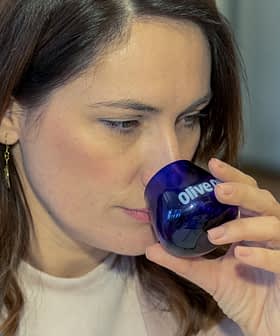Eating salad with a virgin olive oil dressing may deactivate some of its potentially harmful contents, including some common types of bacteria.
New research shows that virgin olive oils might serve as an effective barrier against pathogens commonly found in ready-to-eat and quick salad bags.
We found that in a range going from a few seconds to 15 minutes, some olive oils can greatly reduce the harmful potential of the bacteria. At the same time, they do not destroy beneficial probiotics.
Scientists from the University of Sassari in Sardinia and the Italian National Research Council investigated quick salad bags, which are responsible for a massive increase in salad consumption worldwide.
See Also:Health News“Quick salad bags are minimally processed foods consumed without the need for additional treatment,” the researchers wrote. “Their minimal processing guarantees the preservation of the product’s sensorial features but results in a shorter shelf-life.”
“The high microbiological risk is the main problem associated with the consumption of these products as microbiological contamination is very common in vegetables growing in soil,” they added. “Moreover, their moisture content, pH, transportation and storage may favor the occurrence of post-production pathogen contaminations.”
The researchers found that the risk of harmful contamination drops significantly by applying normal quantities of virgin olive oil to the quick salad bags and eating the salad after about 15 minutes. With certain virgin olive oils, the risk can drop by as much as 90 percent.
The researchers evaluated the antimicrobial properties of virgin olive oils from 13 different Italian olive cultivars, some of which are native to Sardinia and others that grow in several regions of the country, such as Coratina or Sivigliana.
For the study, all of the olives came from a single research grove in Oristano, a province on the island’s western coast. The fruits were harvested simultaneously and transformed into virgin olive oils according to the International Olive Council guidelines at the same oil mill, which is also a university research facility.
“We found that virgin olive oil can be considered a natural antimicrobial,” Severino Zara, the co-author of the study and an agricultural researcher at the University of Sassari, told Olive Oil Times.
“While research shows a growing catalog of studies certifying the excellent nutraceutical qualities of extra virgin olive oils, our research hints at another specific profile of virgin olive oils, which has not been sufficiently investigated yet,” he added. “Some of them can destroy up to 90 percent of the bacterial surface charge of many of the most common pathogens.”
Tests were conducted on salads commonly found on supermarket shelves. The leafy green vegetables were then examined, and any contaminants were removed. After, the salads were inoculated with pathogens such as Candida, Staphylococcus aureus, Salmonella and Escherichia coli along with a few probiotics.
“The antimicrobial activity of the virgin olive oils was tested using quantities which are equal to a normal serving,” Zara said. “This means that we investigated what happens to 100 grams of contaminated salad when a consumer pours a typical virgin olive oil serving on it.”
“We found that in a range going from a few seconds to 15 minutes, some olive oils can greatly reduce the harmful potential of the bacteria,” he added. “At the same time, they do not destroy beneficial probiotics.”
However, not all virgin olive oils acted in the same way. Scientists had already noted different antimicrobial qualities in the olive oils from certain cultivars when analyzing their effect in a lab environment. They then proceeded to test their impact in a real-life situation such as a salad dressing.
See Also:New Research Reveals Key Role of Olive Oil in Ancient Roman Diets“Since we harvested and transformed the olives which were grown with the same climate and in the same area, we had the ideal conditions to compare the effects of the different cultivars,” Zara said.
“When experimenting in vitro, we had seen how certain virgin olive oils would fare within an hour of pathogen inoculation and found that in many virgin olive oils, most bacteria would almost instantly die,” he added. “In others, some bacteria would still be active after one hour from exposure.”
As a result of the in vitro experiments and the subsequent real-life simulation, scientists identified the local olive cultivar Bosana and Sivigliana as more effective in eliminating pathogens.
“Even pathogens such as Salmonella, which is a gram-negative bacterium, and it is way more resilient than others, have been greatly reduced and curtailed by the virgin olive oil effect,” Zara said.
The most effective cultivars contained higher levels of polyphenols.
“While in different seasons and locations polyphenol levels in olive oil might change, cultivars such as Bosana sport a profile which results in a high polyphenolic content because of its genetic characteristics,” Zara said.
Given the very mild effect of the addition of virgin olive oil on the probiotic content of the salad, which maintains their nutraceutical qualities intact, researchers believe that extra virgin olive oils high in polyphenols should be formally considered antimicrobial.
“Further studies are needed to confirm the results obtained,” the researchers wrote. “Indeed, although this work strongly supports the utilization of olive oils, not only for their nutraceutical, but also for their antimicrobial properties, it is important to underline that its utilization could have some limits (also important to be examined closely) mostly due to the organoleptic modifications of olive oils when they are added as dressings if ready-to-eat food are not quickly consumed.”
“What we can say is that those who eat using highly polyphenolic olive oils are more protected against contaminations from very common pathogens, even more, when eating ready-to-eat food,” Zara concluded.









